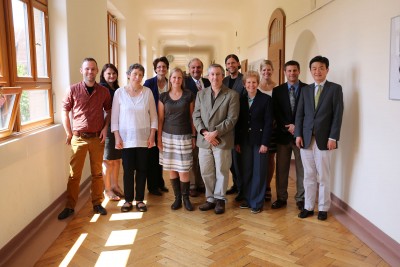Few would likely dispute the enormous impact that globalization has had in recent decades on every aspect of civilization, from international commerce to technology to concerns about the environment. But where might education fit into this equation?

Perhaps more than ever before, the idea of shaping students into thoughtful, responsible global citizens has become a priority for many of today’s higher education institutions. As a member of Universitas 21 – a network comprising prestigious research-intensive universities around the world – and as a land-grant university offering more than 300 study abroad programs on six continents, UConn is certainly no exception.
Within the Neag School of Education, that concept of global citizenship, which has been a part of the School’s teacher preparation program for more than a decade, has the opportunity to expand further. For future schoolteachers who will go on to educate a generation coming of age in an increasingly multicultural, interconnected society, having a certain level of global competence may prove more important than ever before.
And yet, traditionally, “the current American teaching force has not been very global,” says Yuhang Rong, assistant vice provost for global affairs at UConn. “Teacher preparation in the United States, on a national level, has been very domestic-oriented.”
“We are out in front here, at the moment, in terms of internationalizing our teacher education programs.”
—Associate Professor David Moss
The Neag School’s integrated bachelor’s/master’s (IB/M) program is, in fact, one of the few education programs in the country that currently offers a semester-long component dedicated to school-based research abroad, in London. Next year, the School will also launch a similar opportunity in Nottingham, England.
Ensuring that all educators prepared by the Neag School have global competence built into their curriculum is, ultimately, part of the School’s vision for its IB/M students, Rong says.
‘Taking a Step Forward’
In an effort to explore this dynamic further, Rong, along with a delegation of six Neag School faculty members and administrators, including Neag School Dean Richard Schwab, connected this past July with school of education colleagues at four German universities.
The visit took UConn’s seven delegates to the German state of Baden-Württemberg, a region with which Connecticut has a longstanding partnership, having established a student exchange program there in 1991. Hundreds of students from Connecticut have traveled to Baden-Württemberg to study over the past 20-plus years – many of them through UConn’s Eurotech engineering program, for example. However, according to data from UConn’s Office of Global Affairs – which took over administration of the state partnership with Baden-Württemberg this past summer – not one of those students traveling to Germany over the past decade was in the field of education.

The Neag School is seeking to change that.
With their counterparts at the University of Education Ludwigsburg, University of Education Weingarten, University of Tübingen, and Heidelburg University of Education, UConn’s delegates spent time discussing each country’s approach to teacher preparation, recent developments in education reform, and lessons learned – as well as ways to provide meaningful exchange opportunities for students and faculty going forward.
“We are out in front here, at the moment, in terms of internationalizing our teacher education programs,” says Associate Professor David Moss, one of UConn’s visiting delegates. “There are many more perspectives on research and practice in education – beyond the U.S. perspective – that can add value and capacity to the way we do our everyday work. For me, this trip to Germany was catalytic in taking a step forward to internationalize the work we do at the Neag School.”
Onto the World Stage
Currently, the Neag School sends a number of its IB/M students abroad – a number that will nearly double with the Nottingham program. In addition, the IB/M program’s international component is unique in that it is designed for fifth-year students who have already completed student teaching.
“We send our students on an international teaching internship, and that is an entirely different ballgame than sending somebody abroad to learn basic practices of teaching,” says Moss, who has directed the Education in London Study Abroad Teaching Internship Program for the past 15 years. “It is a real value-added component that they arrive abroad, ready to look at different things than they would if they were still trying to develop basic competencies in teaching.”
And while “taking them out of their comfort zones … can help them develop the empathy and understanding of what it’s like for students in their own classes,” he says, that is only part of it. The real focus – at least with the London program – is on intercultural competence; in other words, as Moss says, ensuring that students gain “the skill sets to negotiate with parents, communities, and students who have viable cultural norms and systems other than their own.”
Moss is confident that the demand will remain high among IB/M students for even more study abroad offerings. In fostering partnerships with German universities as well as other institutions worldwide, he and others from the Neag School hope to see global teacher education at UConn expand even further.
“I think and we’re ready to step out on the world stage as a great international program,” Moss says. “The systemic internationalization work that we’re doing now in the School of Education is wholly consistent with the strategic plan and the research and teaching mission of our research university. I think it serves the state and the citizens well. It enhances scholarship; it enhances teaching. It’s not a nice thing to have in the year 2015 – it’s an essential component of a research university.”
 Facebook
Facebook
 Twitter
Twitter
 LinkedIn
LinkedIn
